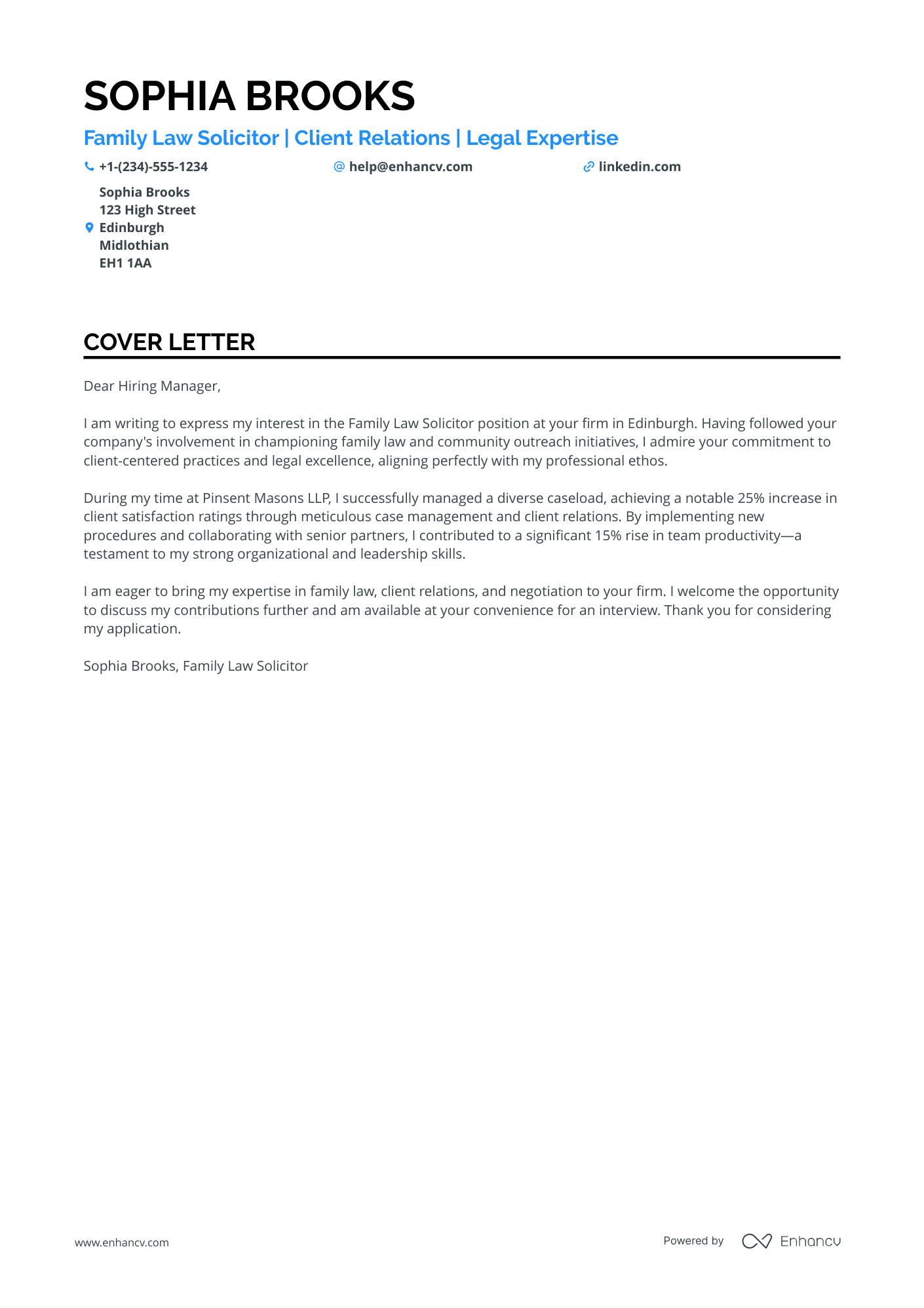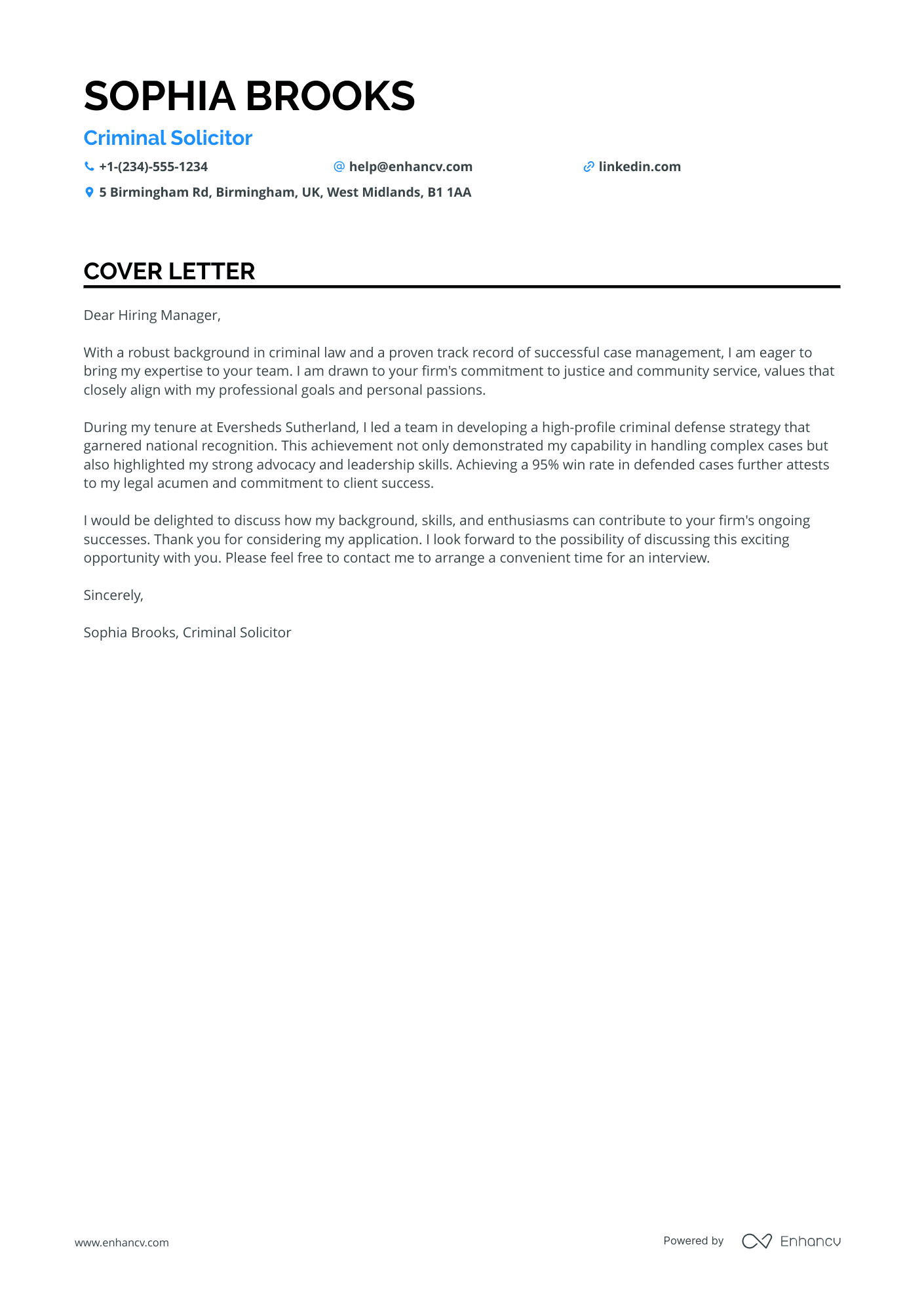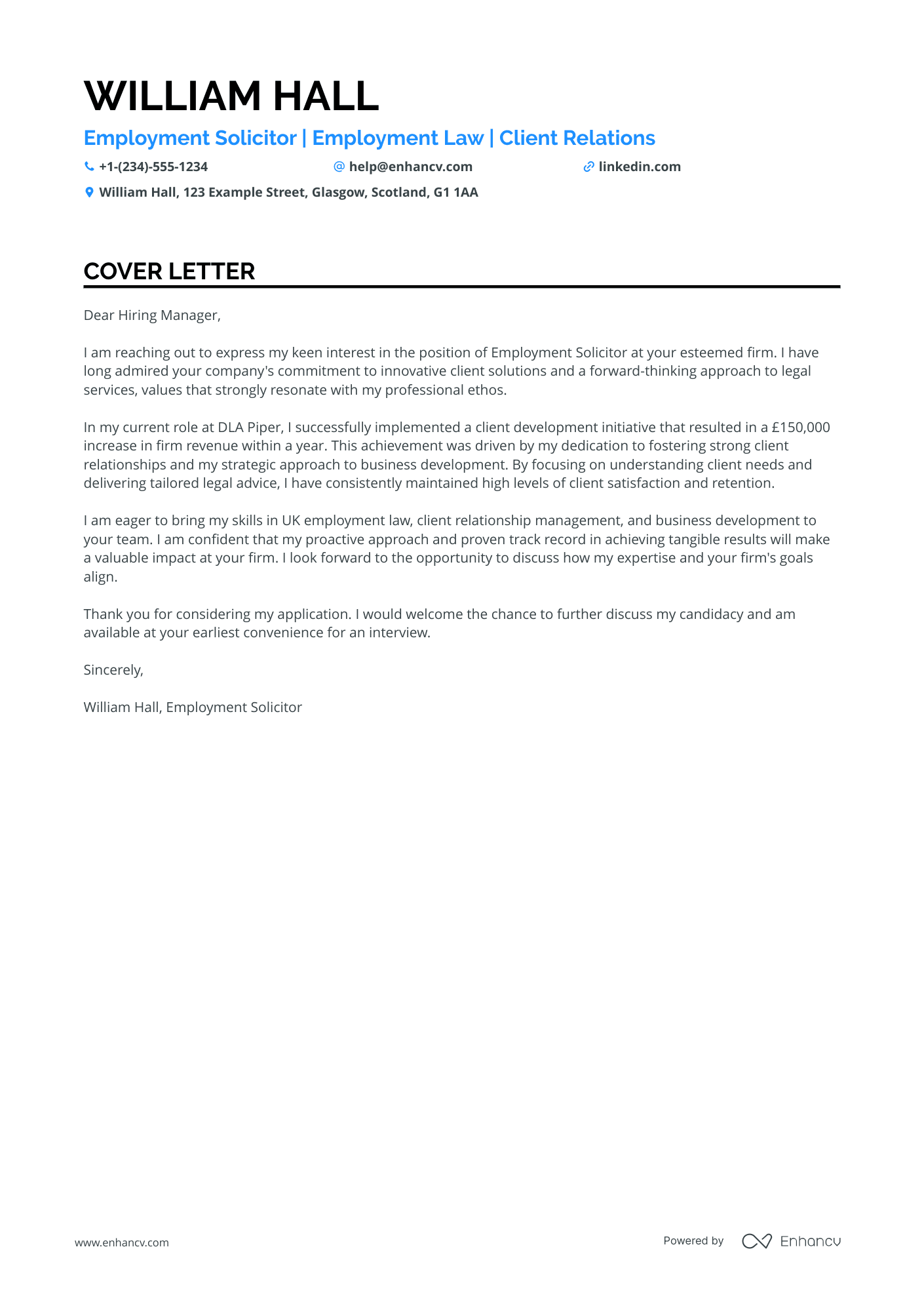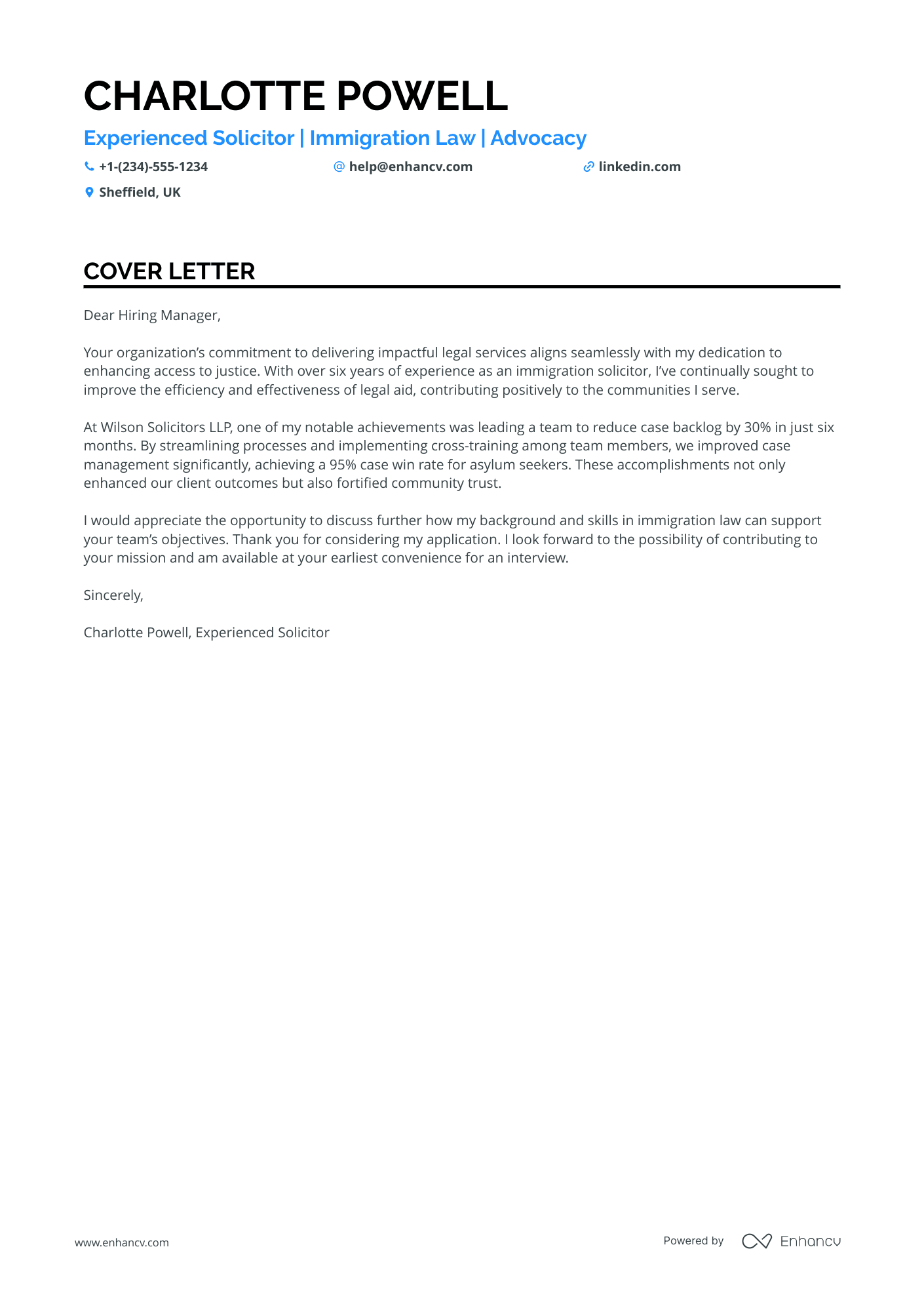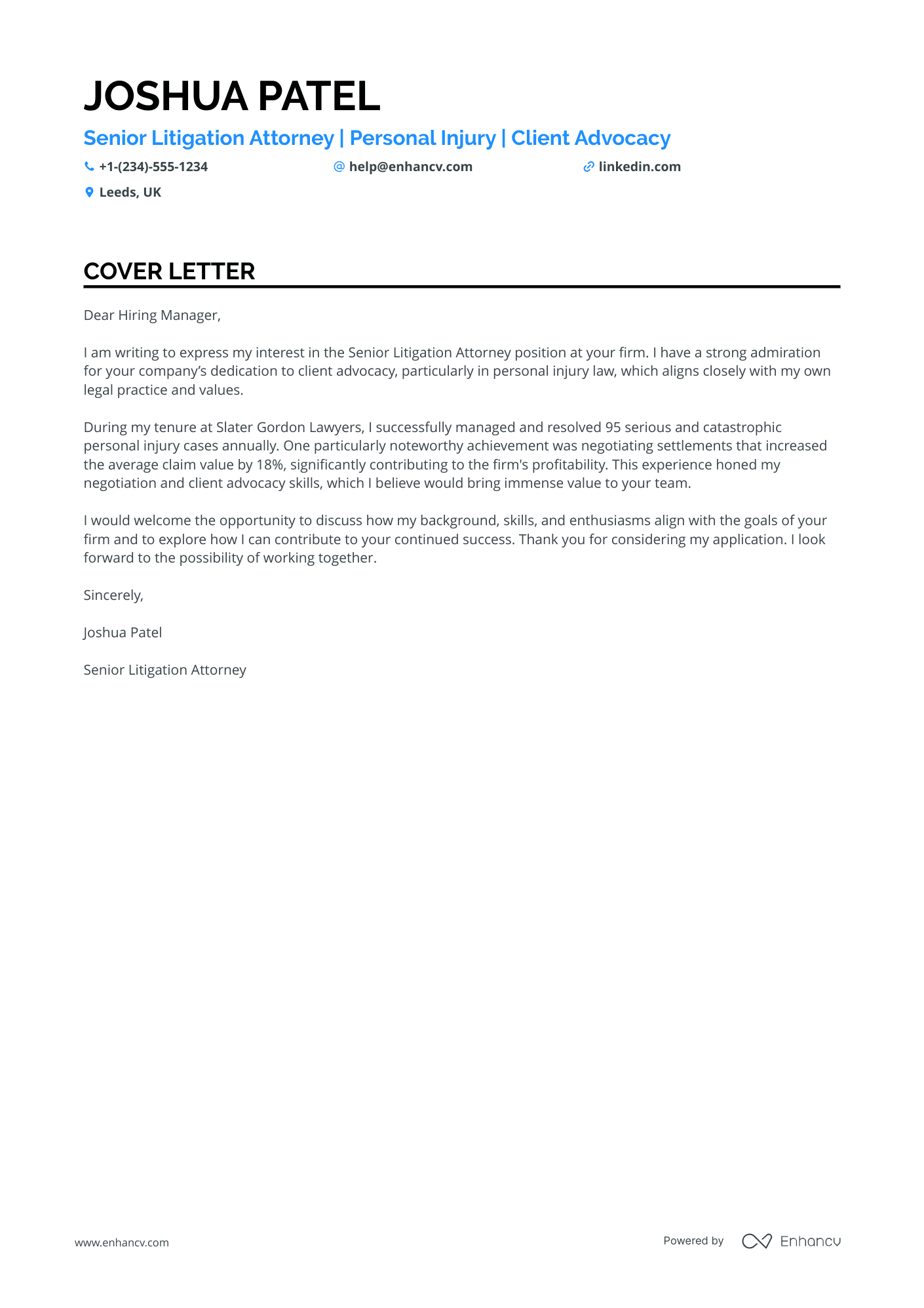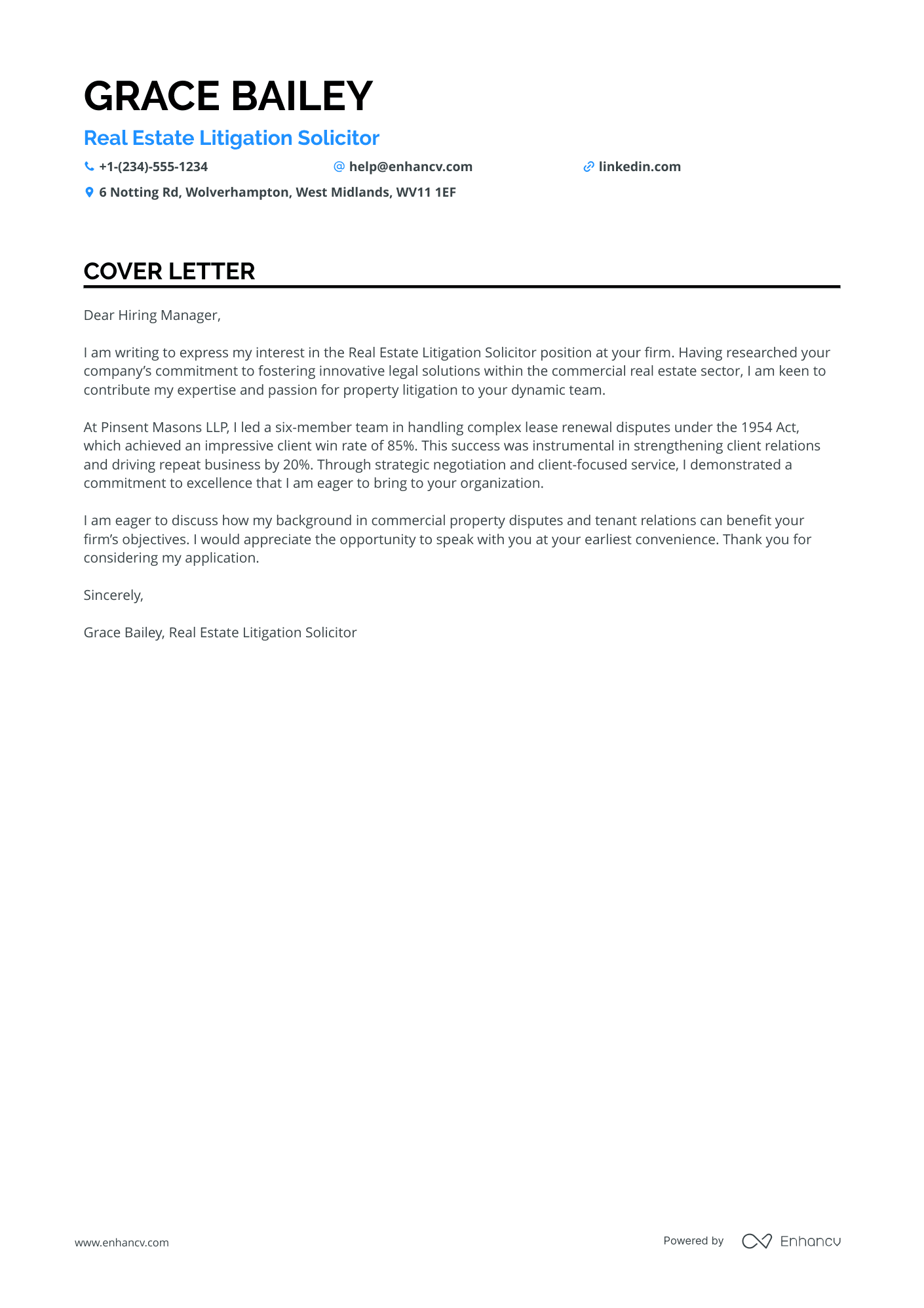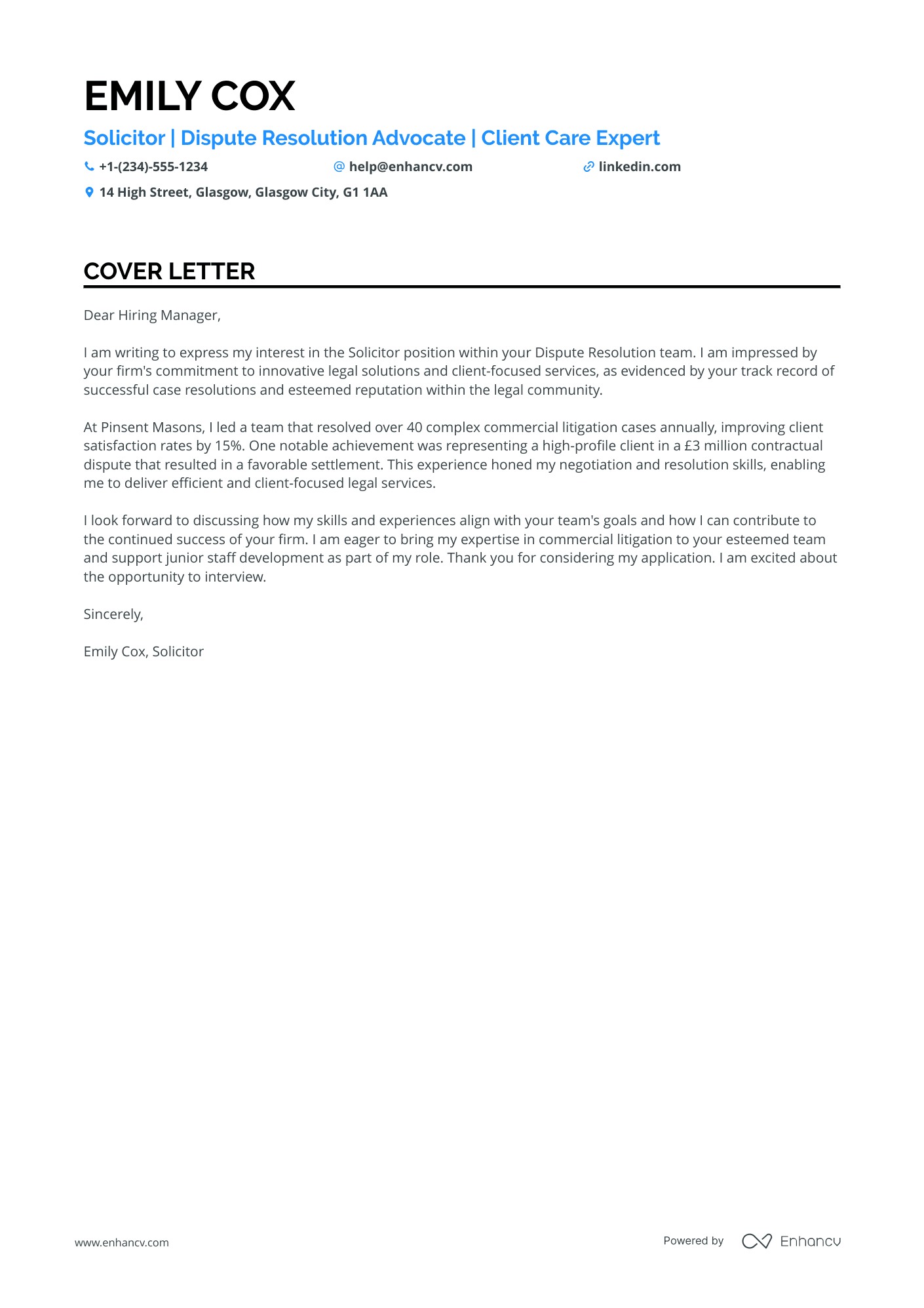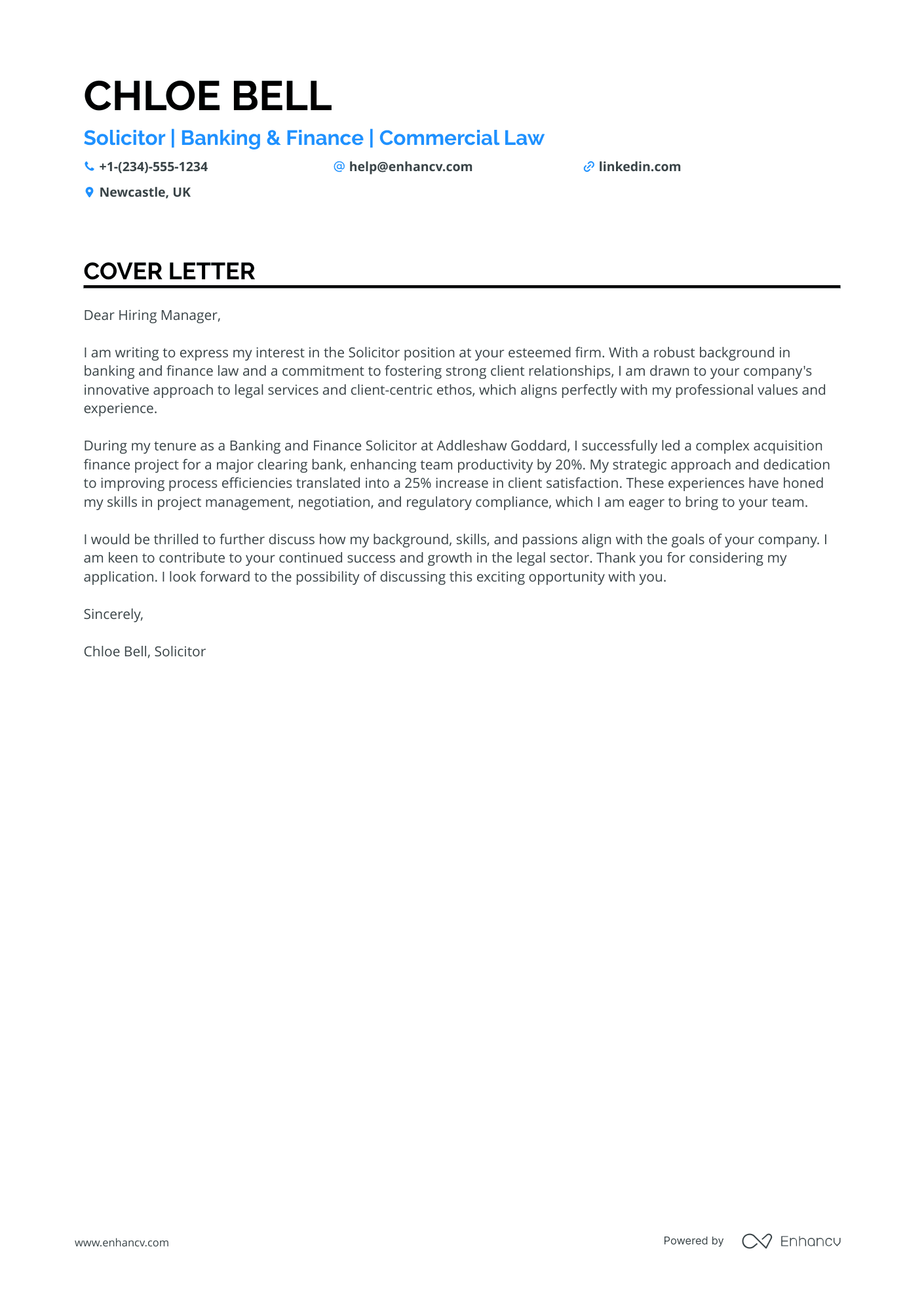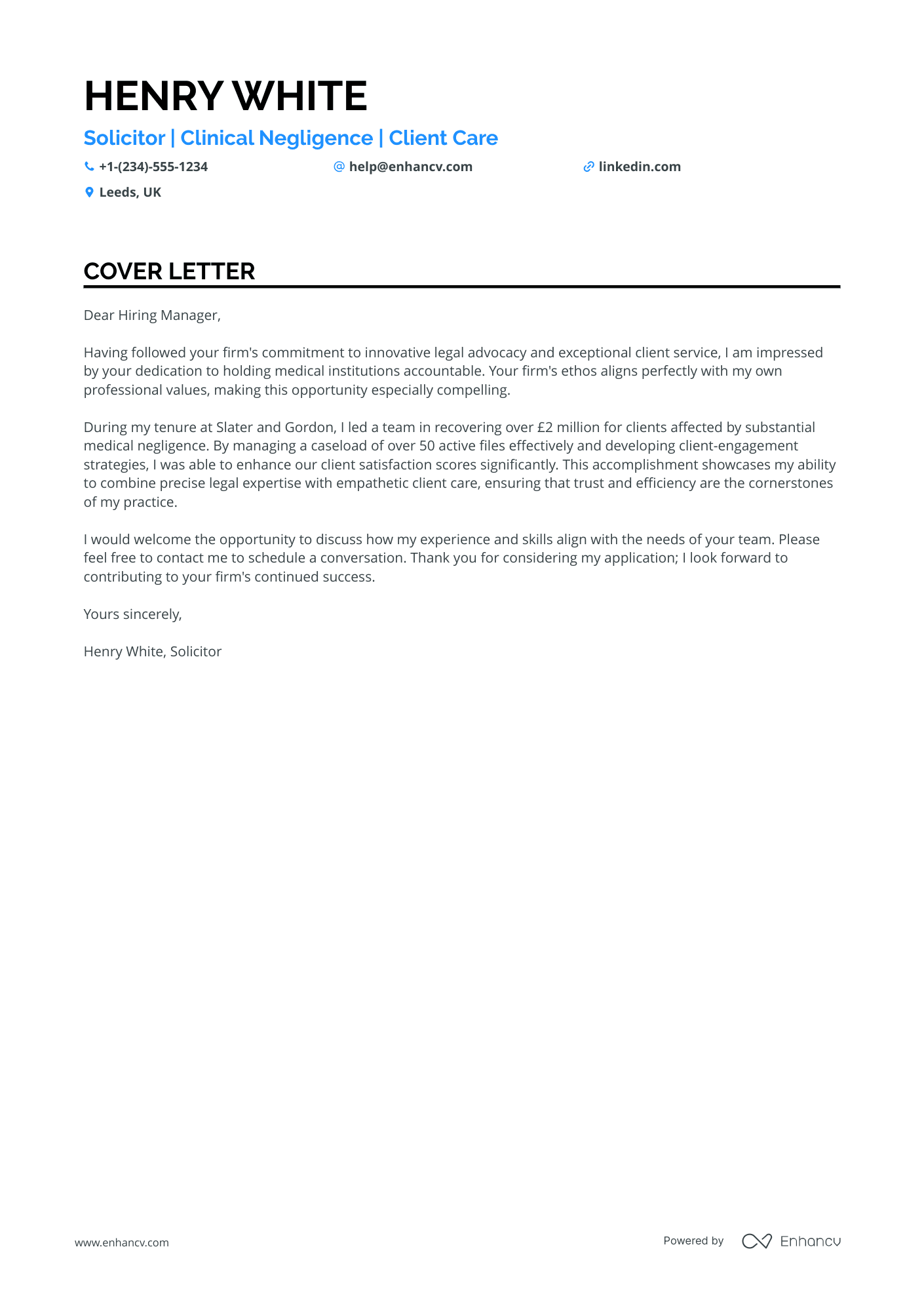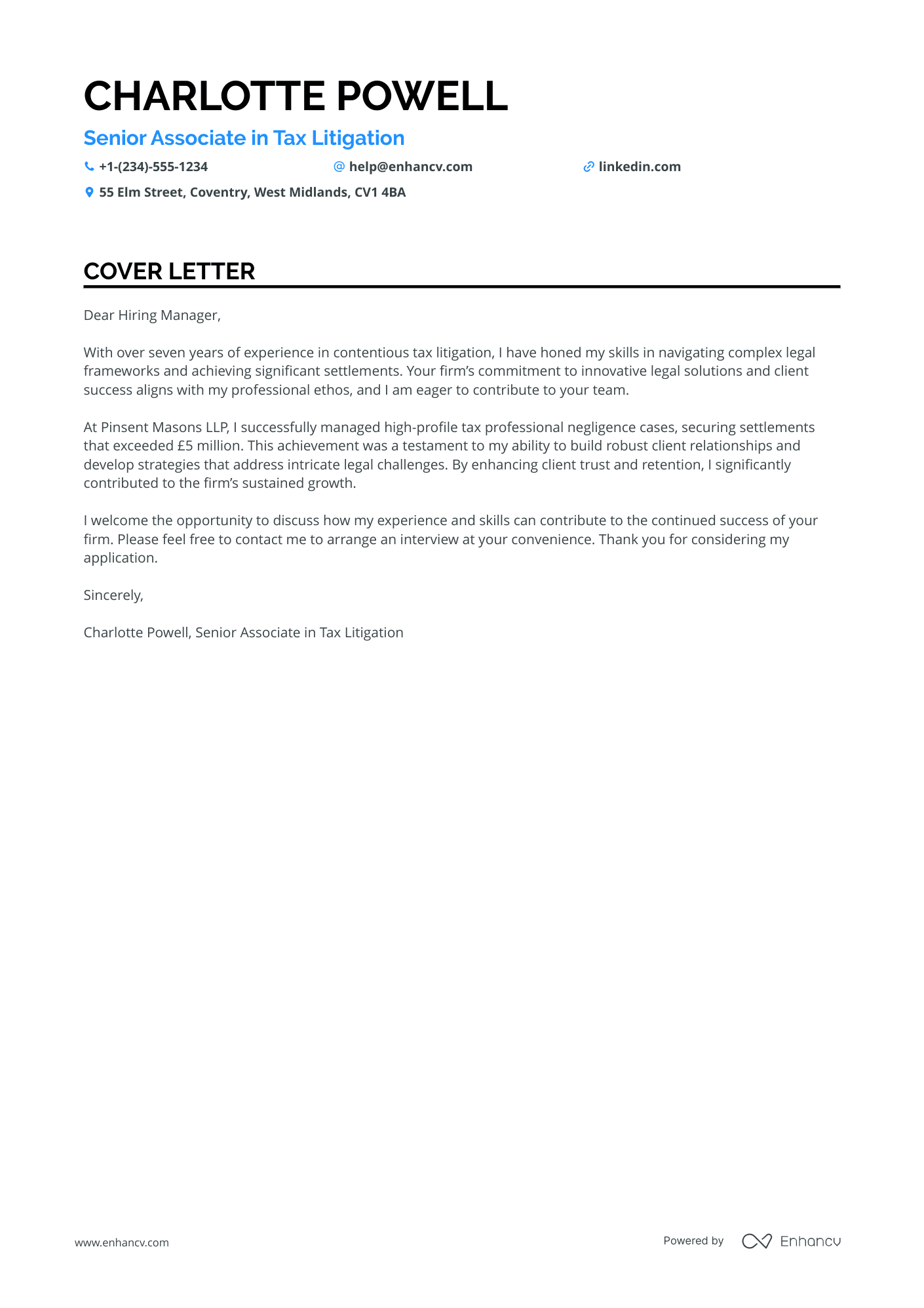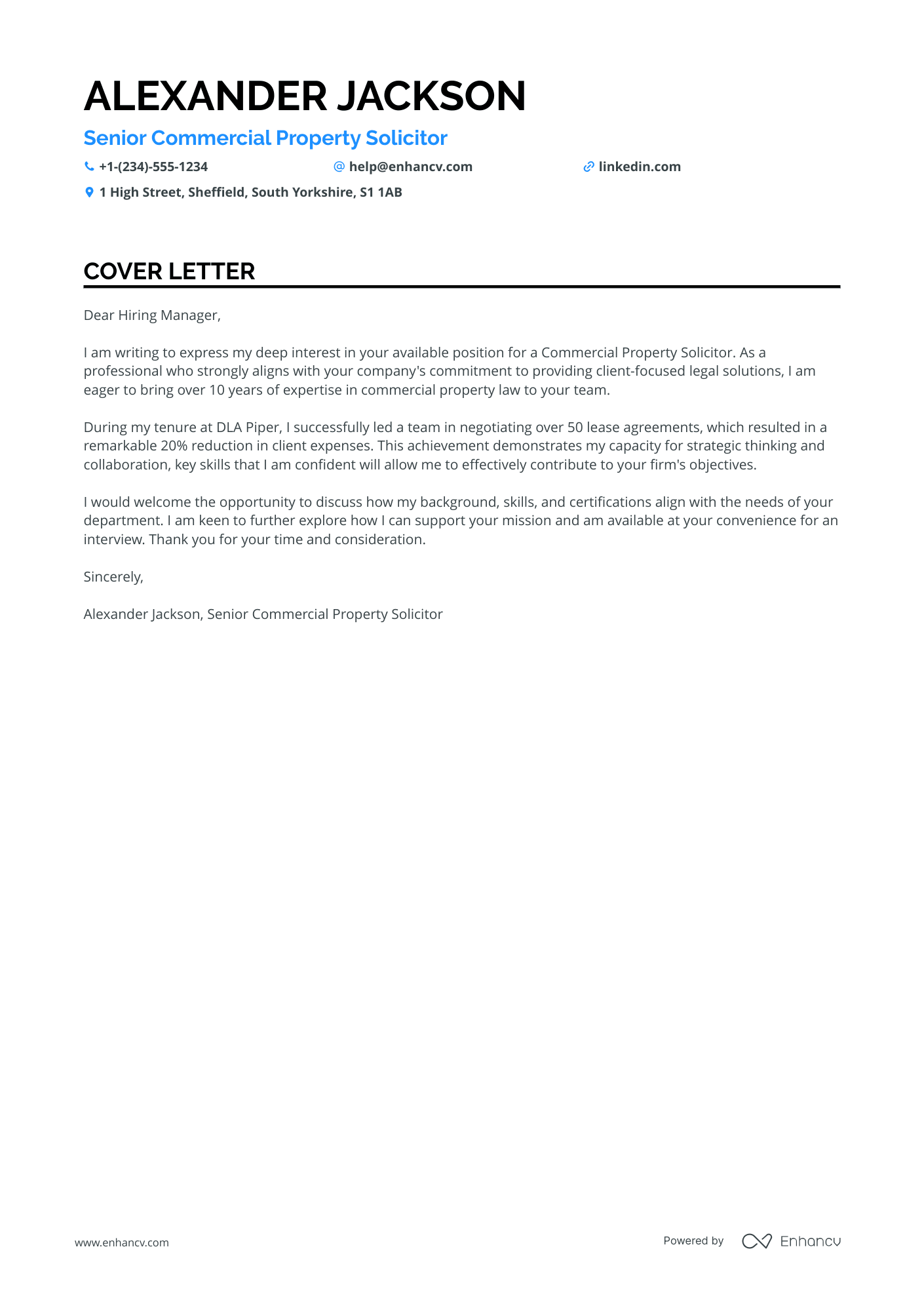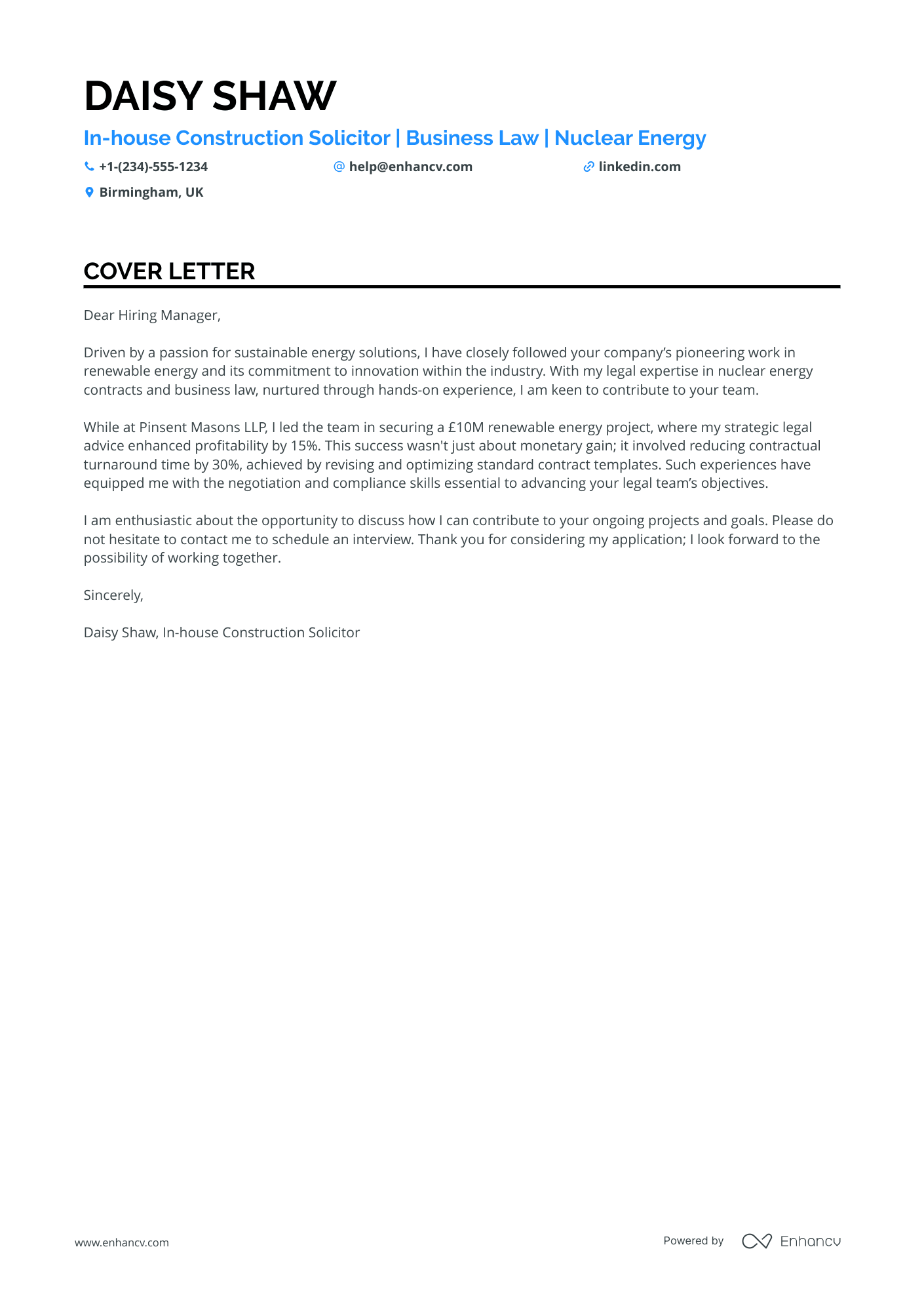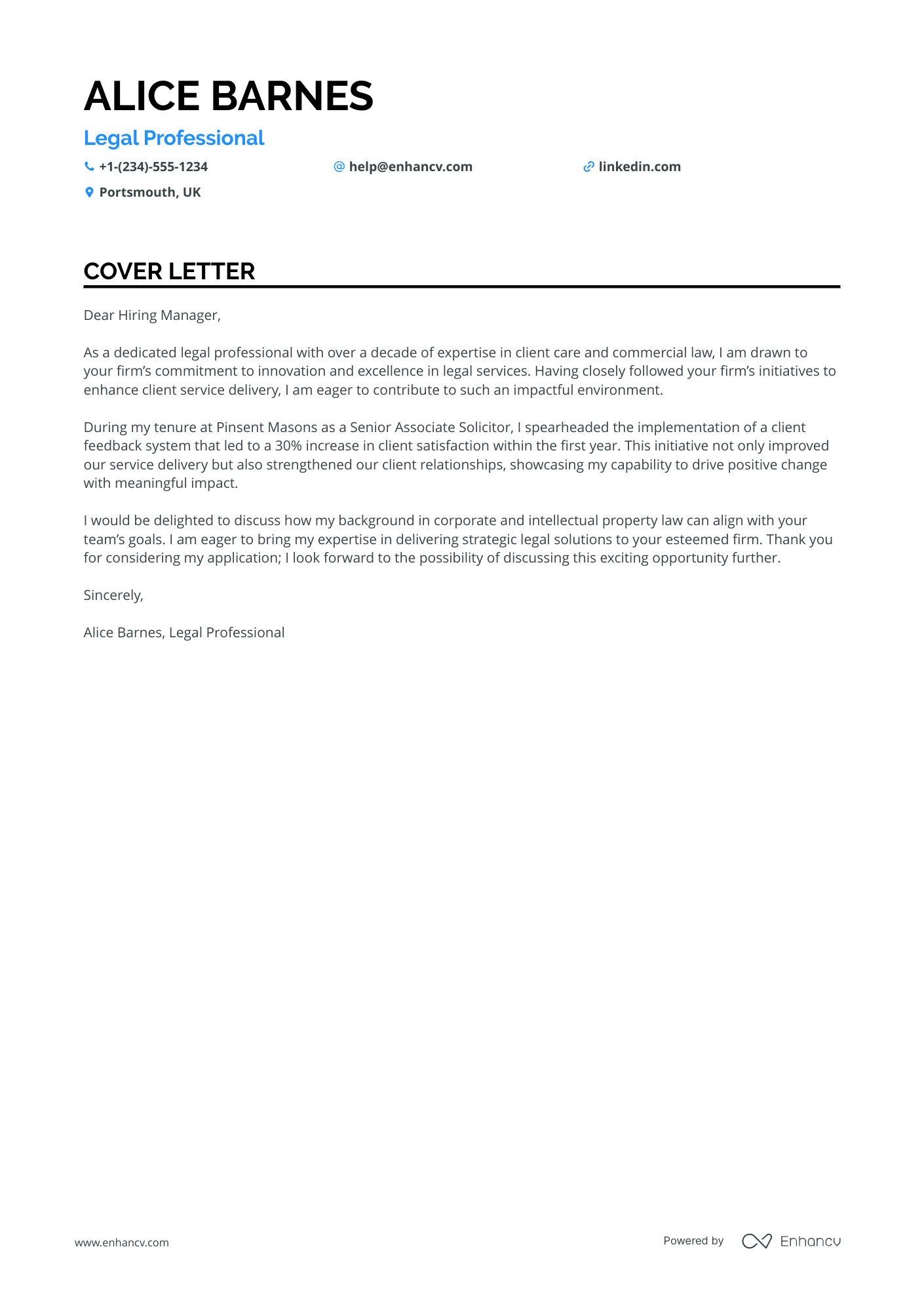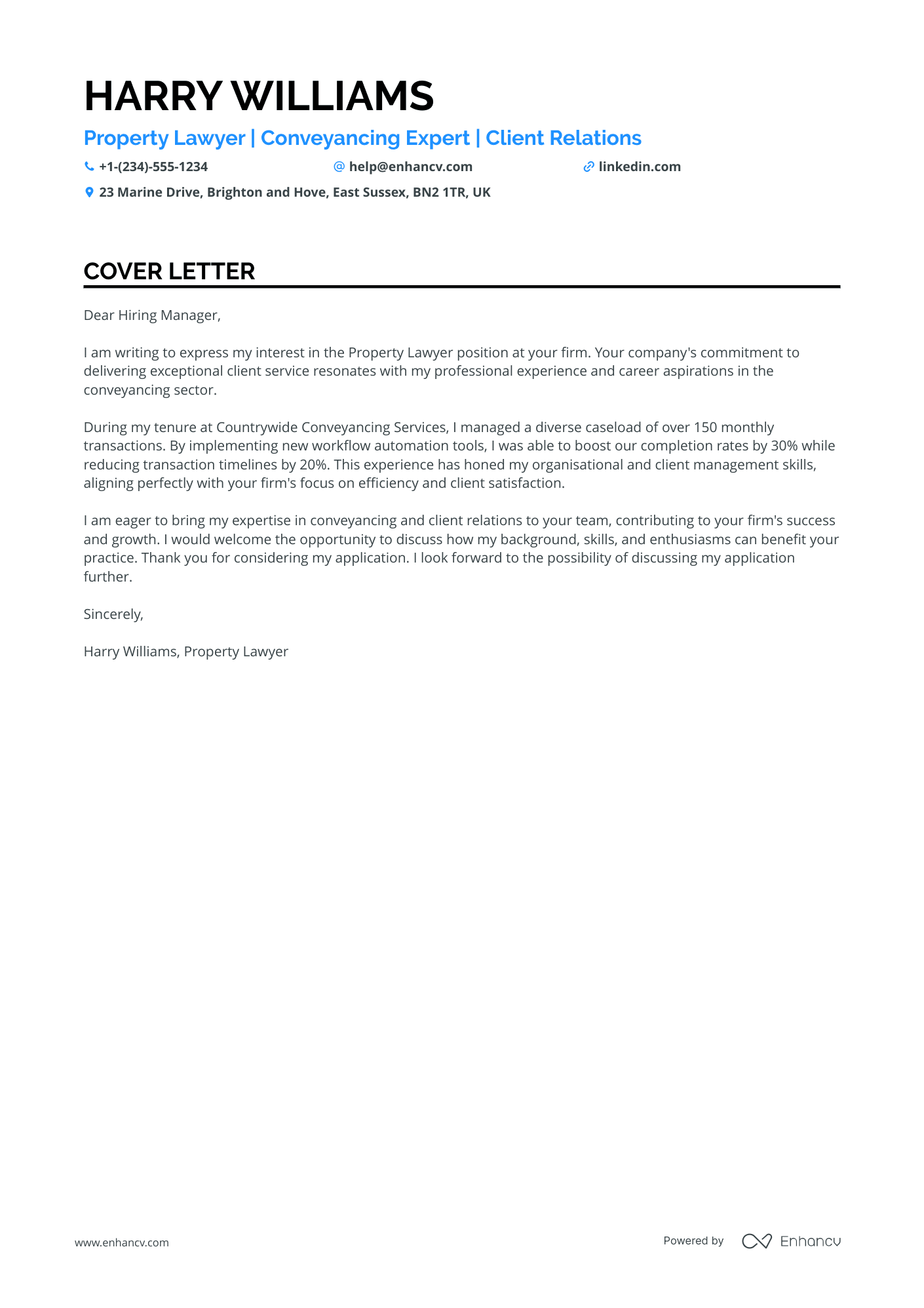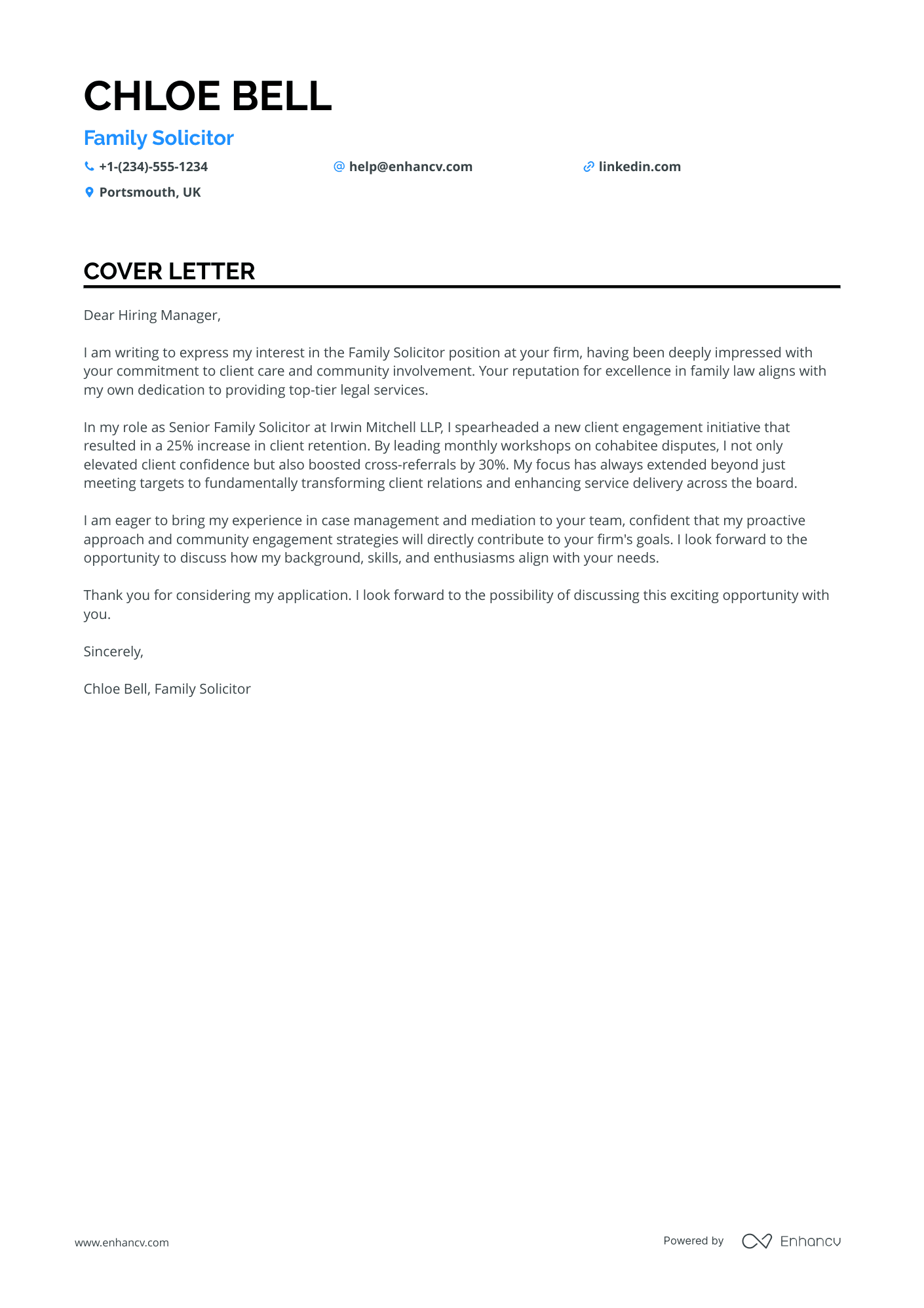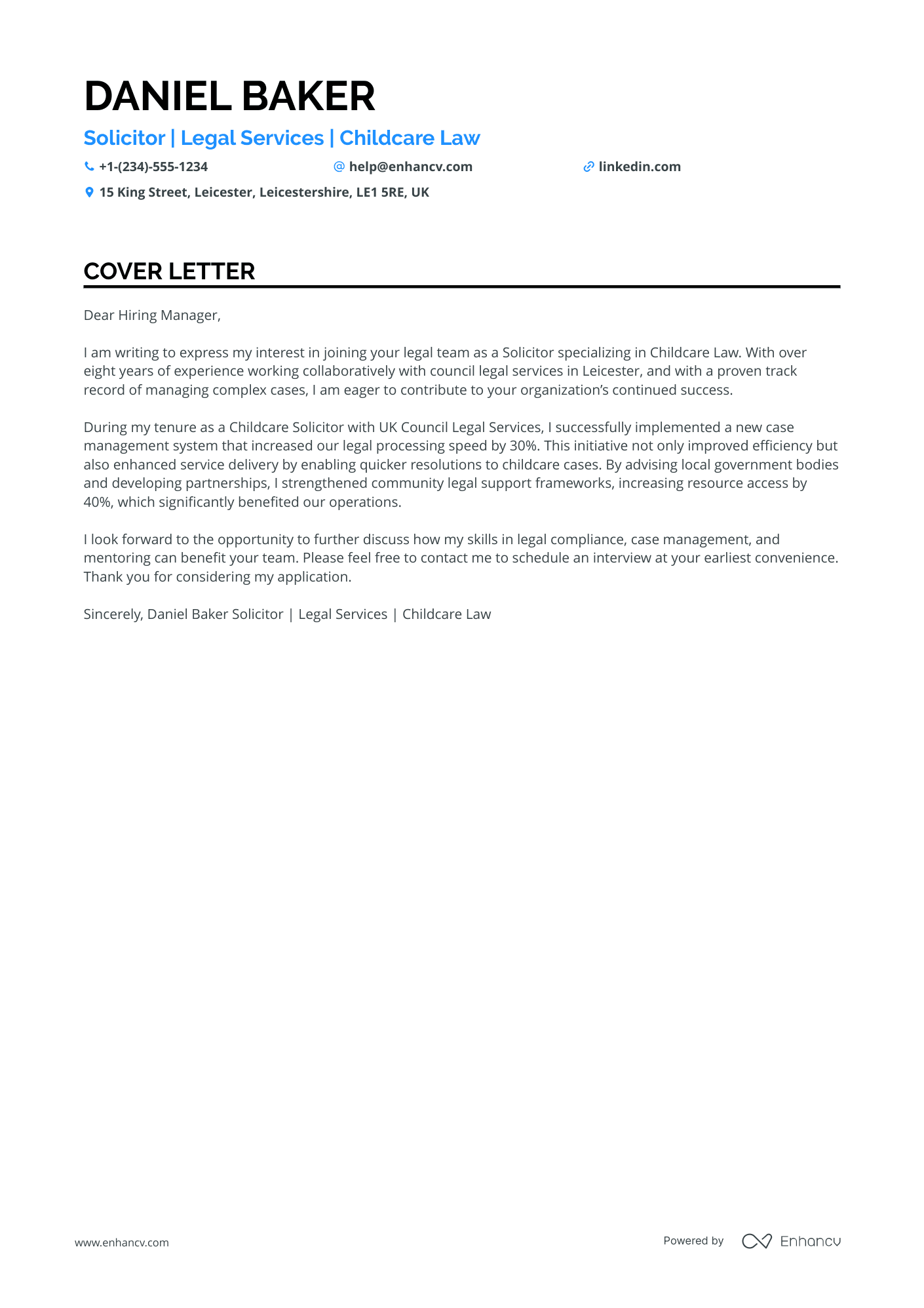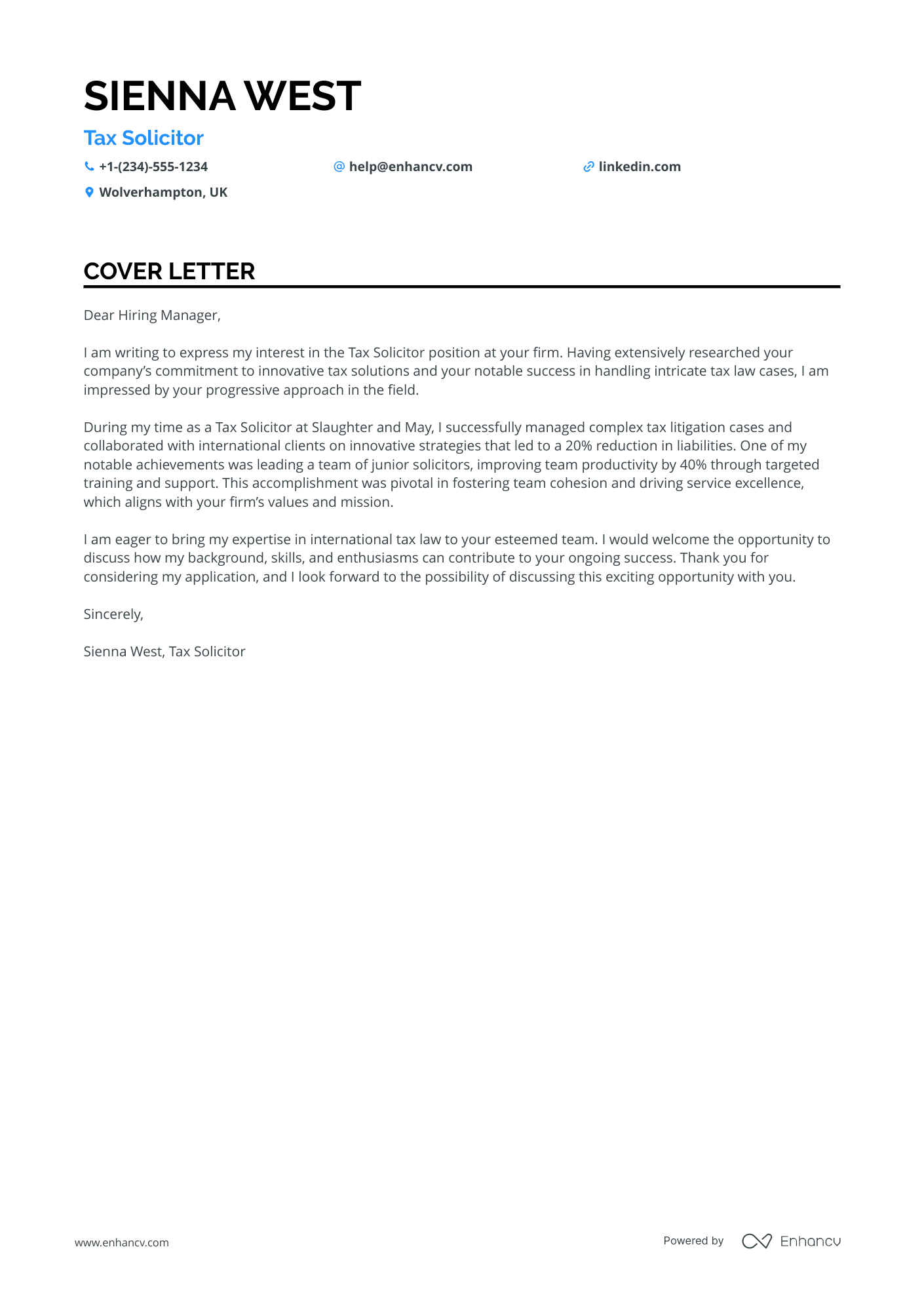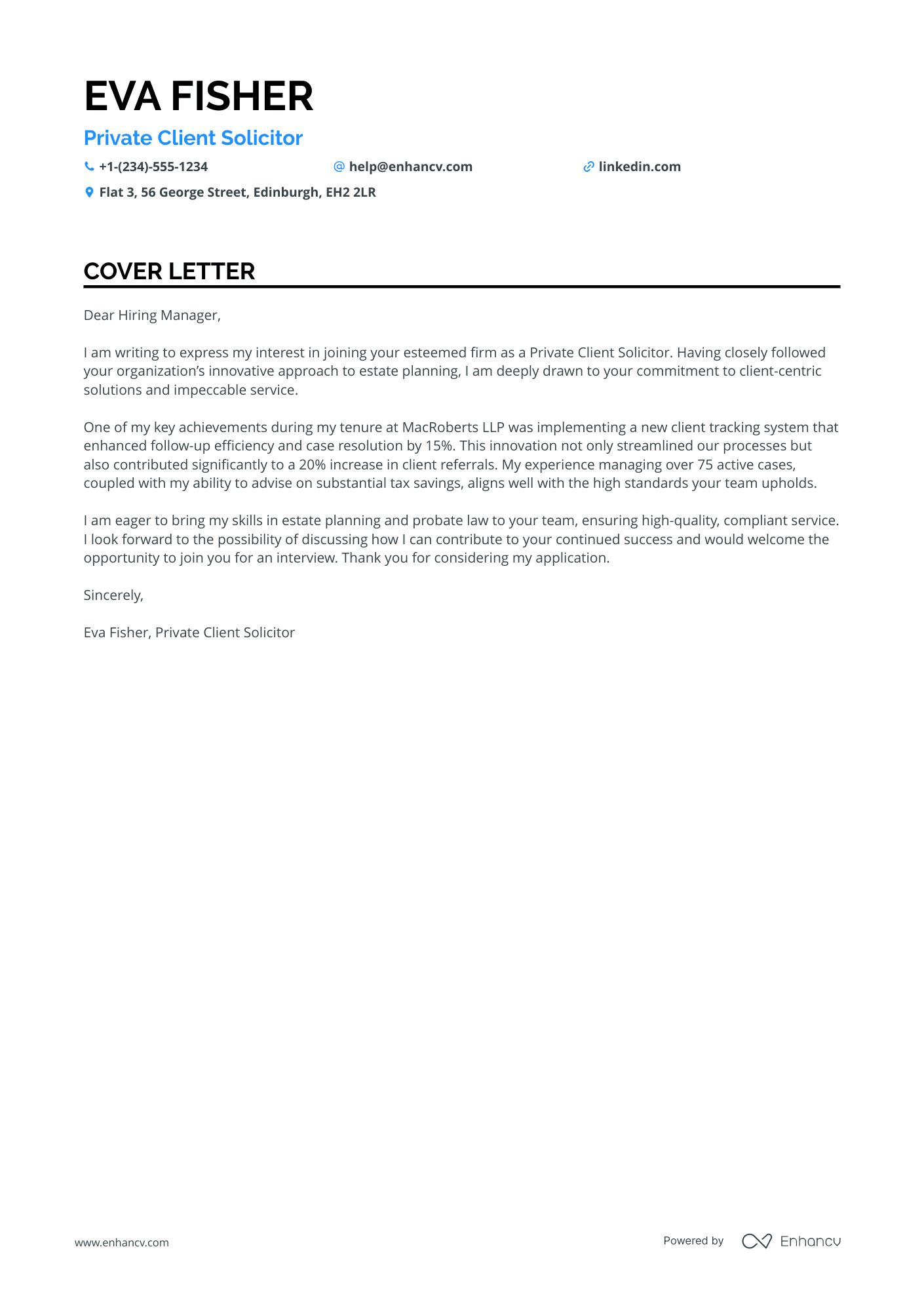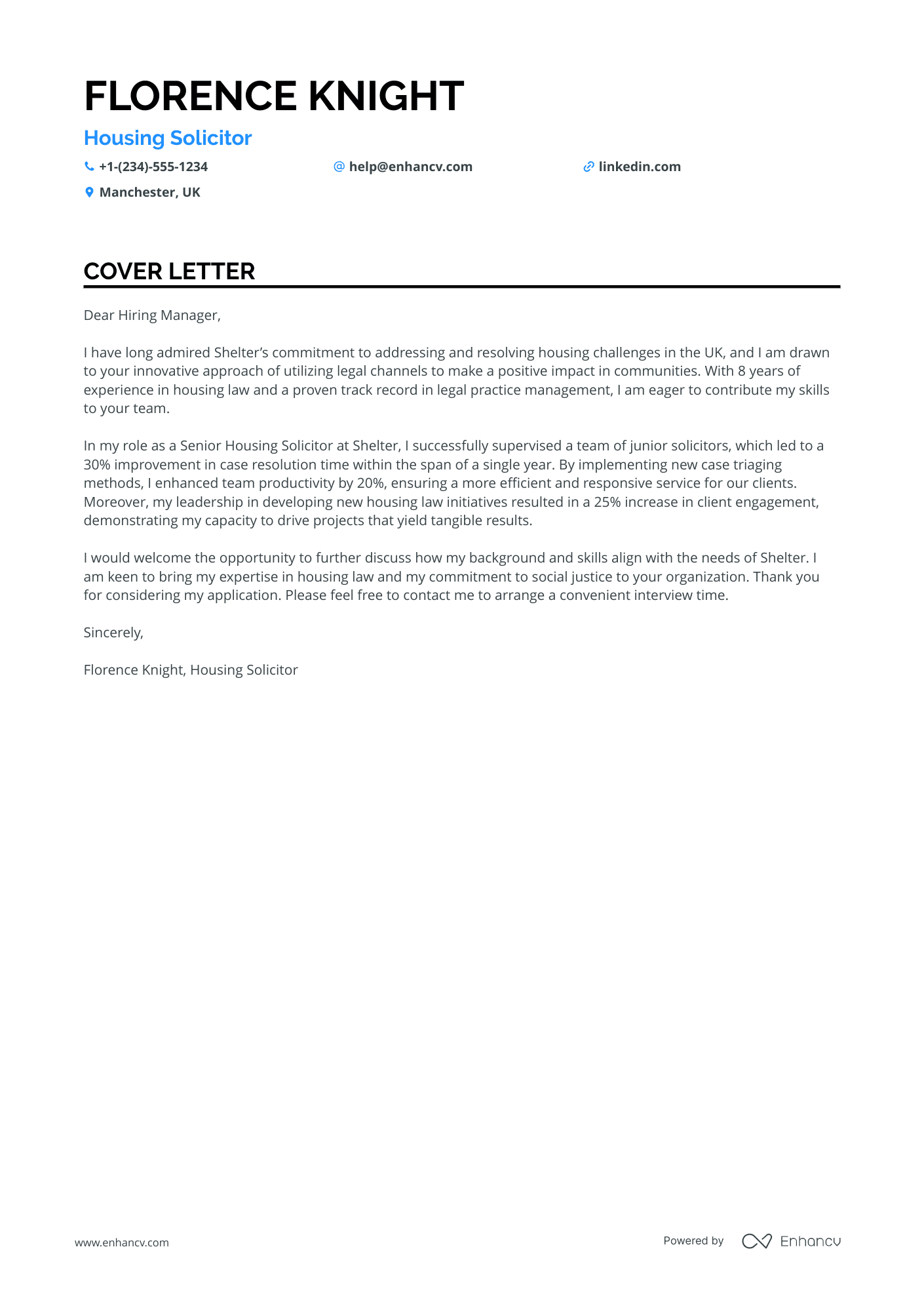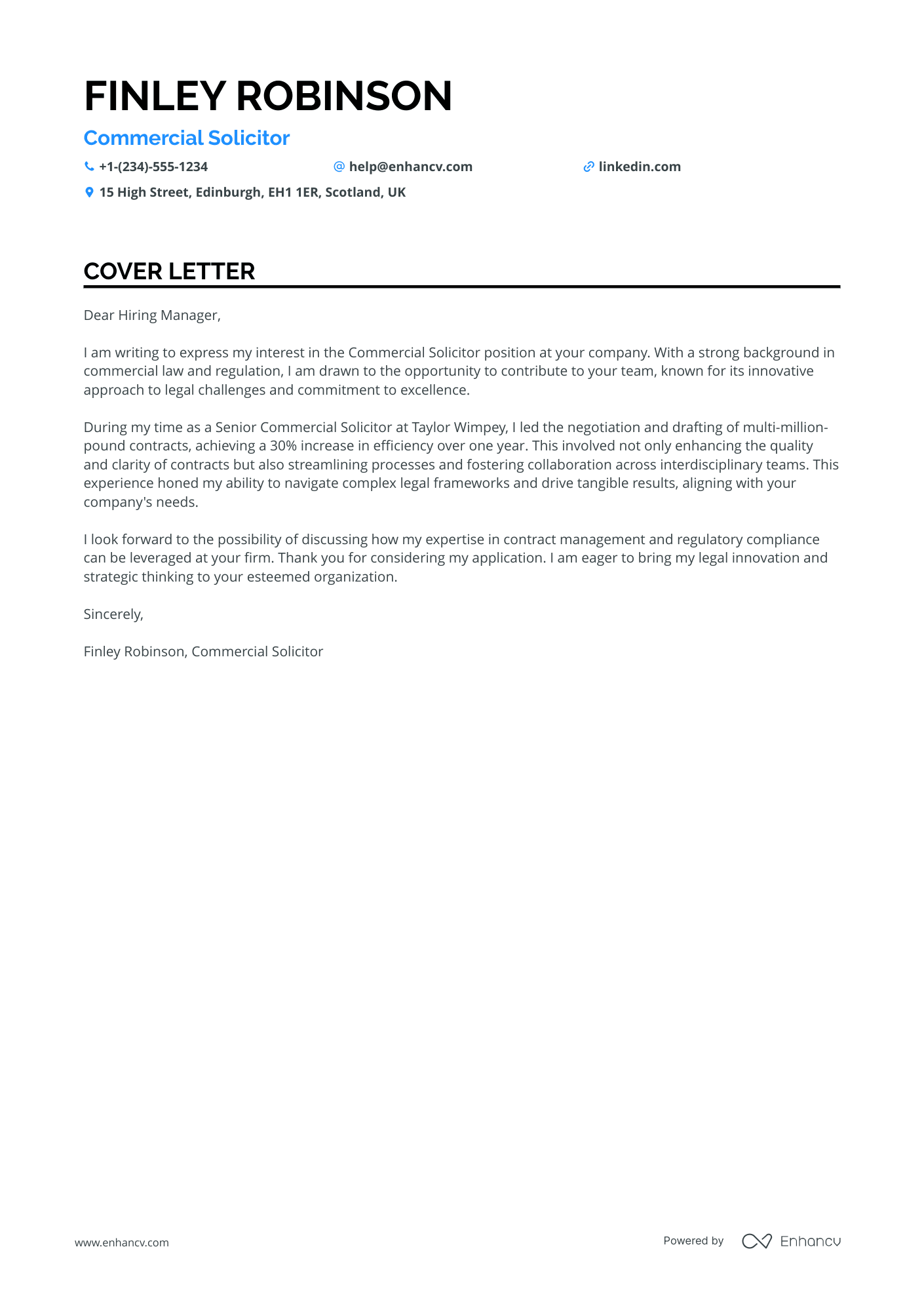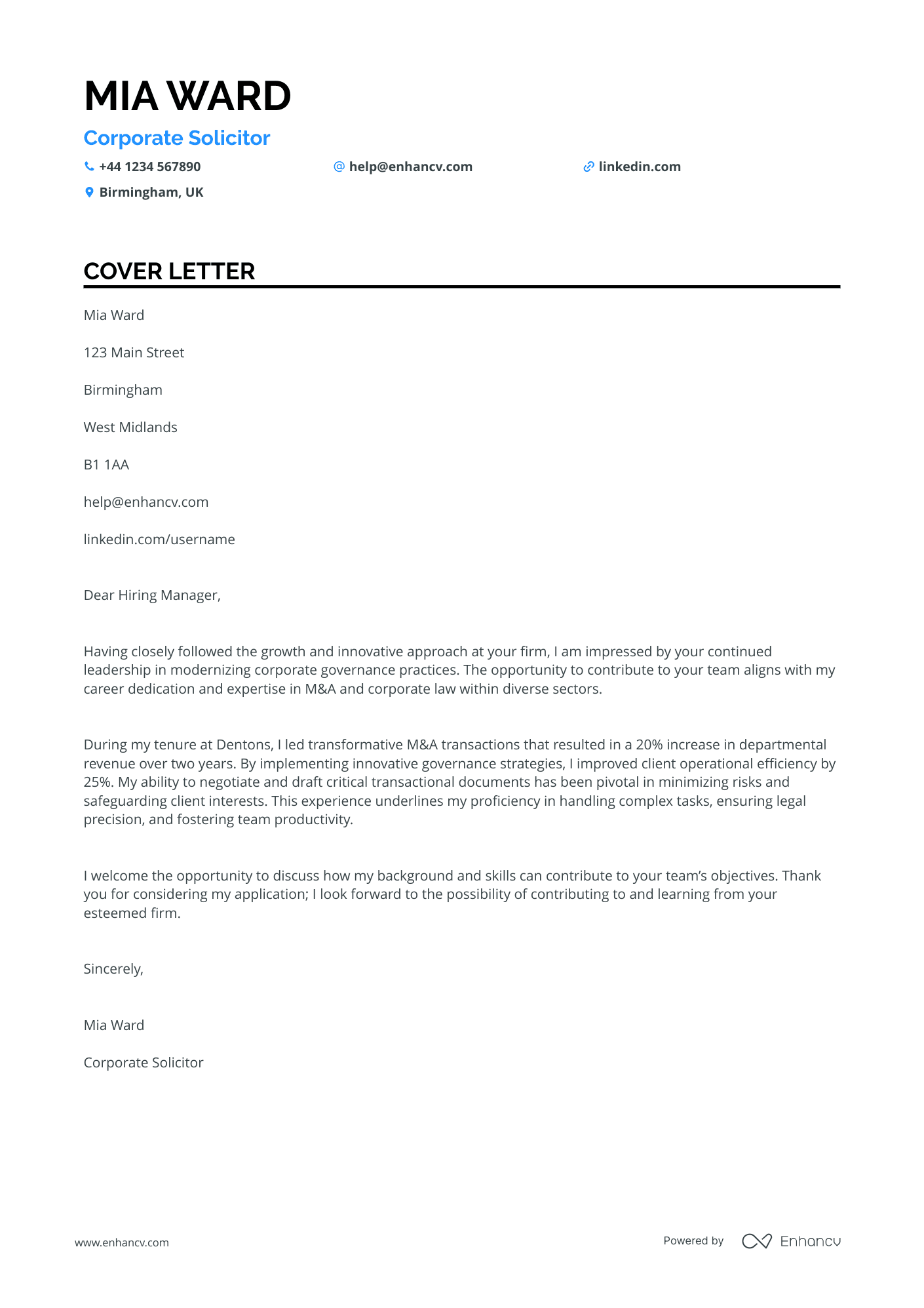When you start applying for jobs, you quickly realise that including a cover letter with your CV is a excellent way to stand out. But what should your cover letter focus on?
Should it emphasise your key achievements or simply list your responsibilities? And how can you effectively demonstrate that you're the ideal fit for the role?
One of the most common mistakes candidates make is either underselling themselves or overstating their experience.
In this guide, you’ll learn how to craft a compelling cover letter by showcasing your most significant professional achievement and telling the story behind it.
Cover letter examples for solicitor
By Experience
Senior Family Law Solicitor
- Specialisation and Experience: The cover letter effectively highlights specialisation in family law with a solid foundation of two years of experience, making the candidate well-suited for the role of a Family Law Solicitor.
- Key Achievements: Demonstrating concrete achievements like a 30% increase in client retention and improvements in team productivity and firm visibility adds credibility and value to the candidate's profile.
- Education and Continuing Education: Highlighting a specialised Master of Laws (LLM) in Family Law, combined with participation in relevant courses like Advanced Family Law Practice, underscores the candidate’s commitment to professional development.
- Client Relations and Community Engagement: Emphasising client relations skills and community engagement initiatives showcases the candidate's dedication to not just legal practice but also client advocacy and public education, which are crucial for a Family Law Solicitor.
Trainee Criminal Solicitor
- Highlighting Success Rate: The cover letter effectively mentions the candidate's 95% win rate in represented cases, which showcases their competence and expertise in managing criminal cases.
- Emphasising High-Profile Cases: By mentioning national case recognition and high-profile case acquittals, the candidate demonstrates their capacity to handle significant and complex cases, adding credibility.
- Showcasing Relevant Skills and Certifications: The inclusion of specific skills like advocacy, legal research, and accreditations such as the Duty Solicitor Accreditation Course reflects the candidate's preparedness and qualification for the role.
- Leadership and Client Relationship Building: The cover letter effectively communicates the candidate's experience in leading teams and maintaining strong client relationships, both essential for a successful criminal solicitor.
Junior Employment Solicitor
- Highlighted Industry-Specific Experience: Successfully leveraging specific employment law experience, such as the management of employment tribunal cases with a 95% win rate, positions the candidate as adept and results-driven in their field.
- Client Relations Emphasis: By including achievements like a 30% increase in client satisfaction and a revenue boost of £150,000, it showcases the candidate’s effectiveness in fostering client relationships and driving business growth.
- Relevant Certifications: The mention of an "Employment Law Advanced Certification" underlines the candidate's commitment to continuous professional development, reflecting specialised knowledge critical to their role.
- Leadership and Team Development: Demonstrating leadership capabilities, such as supervising junior solicitors and enhancing their competency by 40%, illustrates the candidate’s potential to thrive in a managerial role.
Principal Immigration Solicitor
- Highlighting a specific achievement: The cover letter effectively emphasises the candidate's biggest achievement of reducing the case backlog by 30% while mentoring legal personnel, demonstrating process improvement and leadership skills.
- Specialised skills: The candidate's proficiency in immigration law and advocacy, alongside their experience with legal aid, is mentioned prominently, aligning well with the specialised requirements of an immigration solicitor's role.
- Leadership and team development: The cover letter successfully underlines the candidate's experience in training and developing junior solicitors, which is essential for fostering team growth and ensuring continued legal service excellence.
- Community engagement: Their role in coordinating outreach programmes and increasing public engagement by 40% highlights their commitment to raising awareness of legal rights, which is valuable for building trust and a firm's reputation.
Associate Personal Injury Solicitor
- Specialised Skills: The cover letter effectively highlights specialised skills such as personal injury litigation, mediation, and client advocacy, which are crucial for a Senior Litigation Attorney role.
- Quantifiable Achievements: Including quantifiable achievements such as a 20% increase in client settlement success rate and leading initiatives that improved client satisfaction by 30% illustrates the candidate's impact and effectiveness in previous roles.
- Leadership and Mentorship: Emphasising the supervision of a team of junior attorneys and the development of a mentorship programme showcases the candidate's leadership abilities, a vital aspect of a senior-level position.
- Certification and Continued Education: Mentioning continuing education courses such as 'Advanced Mediation Skills' and 'Personal Injury Law and Practice' underlines the candidate's commitment to staying informed and enhancing their expertise in their field.
Senior Real Estate Solicitor
- Emphasise experience in specific legal areas such as lease renewals, tenant disputes, and boundary issues, which are crucial for a Real Estate Litigation Solicitor.
- Highlight achievements in improving client satisfaction and client win rates, as these demonstrate proven success in client relations and litigation outcomes.
- Include any relevant certifications or courses like "Advanced Property Litigation" and "Telecoms Law and Practice," showcasing specialised knowledge applicable to the role.
- Demonstrate leadership and collaboration skills by referencing examples of leading teams and working with other departments to improve efficiency and client outcomes.
Junior Litigation Solicitor
- Specific Role-Related Skills: The cover letter effectively highlights specialised skills such as commercial litigation, dispute resolution, and client negotiation, which are crucial for a solicitor role focused on dispute resolution.
- Quantifiable Achievements: Emma mentions specific metrics, such as a 15% improvement in client satisfaction and successful settlements in high-value cases, demonstrating a direct impact on firm performance.
- Leadership and Mentoring: The letter emphasises Emily’s capability in supervising and mentoring junior solicitors, showcasing her leadership qualities and commitment to team development.
- Continued Professional Development: Advanced courses like "Advanced Negotiation Techniques" and certifications in legal research signal Emily’s commitment to lifelong learning and skill enhancement, which are essential in the legal field.
Partner-level Banking Solicitor
- Relevant Experience: Chloe highlights over two years of post-qualified experience in banking and finance law, which is crucial for roles in this sector.
- Demonstrated Achievements: Specific achievements, such as negotiating a 10% reduction in interest rates and contributing to firm revenue growth, showcase her ability to deliver tangible results.
- Position-Specific Skills: Mentioning skills like negotiation, regulatory compliance, and drafting legal documents directly aligns with the requisites of a solicitor in banking and finance.
- Education and Certifications: Chloe effectively points to her Master’s degree in Banking and Finance Law and her advanced courses to bolster her specialised knowledge in relevant legal fields.
Associate Solicitor in Medical Negligence
- Highlight Relevant Certifications: The cover letter effectively emphasises specialised certifications such as the "Certificate in Medical Law," underscoring expertise in advanced medical negligence case strategies, which is crucial for a Solicitor in Clinical Negligence.
- Emphasise Key Achievements: Notable accomplishments, such as the "Top Advocate Award" for achieving the highest success rate in case settlements, strengthen the candidate’s reputation as a successful legal practitioner in medical negligence.
- Showcase Client Relationship Skills: The letter wisely underscores skills in client relationship building and client care excellence, integral for maintaining trust and satisfaction in sensitive medical negligence cases.
- Illustrate Experience with Metrics: The usage of quantifiable metrics, like negotiating settlements over £12 million and enhancing client retention by 95%, provides concrete evidence of the candidate’s effectiveness and value.
Senior Civil Litigation Solicitor
- Highlighting Achievements: This cover letter effectively captures significant accomplishments, such as negotiating high-profile settlements and recognition in Chambers UK, which showcase the candidate's expertise and influence in tax litigation.
- Relevant Education and Certifications: The inclusion of specialised education, such as a Master of Laws in Taxation Law and relevant courses like 'Advanced Tax Litigation Strategies', demonstrates targeted knowledge aligning with the role requirements.
- Demonstrating Proficiency Through Experience: Through detailed descriptions of past roles, the candidate clearly presents their skills in areas like tax professional negligence and client relationship building, integral to a Senior Associate in Tax Litigation.
- Showcasing Leadership Abilities: The cover letter adeptly outlines leadership characteristics by detailing the candidate's role in training junior associates and leading landmark cases, indicating their capability to drive team performance and achieve strategic outcomes.
By Role
Commercial Property Solicitor
- Highlight Relevant Experience: The cover letter effectively showcases over 10 years of experience in SME legal solutions, particularly focusing on lease negotiations, property acquisitions, and secured lending, which directly align with the role of a Commercial Property Solicitor.
- Demonstrate Leadership and Results: Significant achievements like leading a team at DLA Piper to negotiate 50 lease agreements with a 20% reduction in client expenses clearly demonstrate leadership and the ability to produce tangible results.
- Showcase Educational Background: The inclusion of both an LLM in Commercial Law and an LLB, alongside additional specialised courses in Commercial Property Law and Advanced Property Finance Strategies, enhance credibility and expertise in the field.
- Emphasise Client-Focused Skills: The strong emphasis on client relationship building and a high client satisfaction rating (95% annually) highlights client-focused skills, crucial for a role that demands significant client interaction and satisfaction.
In-house Corporate Solicitor
- Focus on Specialised Experience: The cover letter highlights Daisy's specialised experience in nuclear energy contracts, which is highly relevant to the role of an In-house Construction Solicitor specialised in Business Law and Nuclear Energy.
- Emphasising Key Projects: Notable projects like leading a team to secure a £10M project demonstrate Daisy's capability and notable success, underscoring her impact in previous roles.
- Quantifiable Achievements: Mentioning specific achievements with quantifiable results, such as a 15% profitability increase and a 20% reduction in liabilities, illustrates Daisy's effectiveness in producing tangible business outcomes.
- Skill-Set Alignment: References to her skills, such as legal compliance, risk management, and contract negotiation, are directly aligned with the required skills for the solicitor role, providing reassurance of her competency.
Intellectual Property Solicitor
- Tailored Experience: Clearly outlines a decade of experience in commercial law and client care, highlighting leadership roles such as Senior Associate Solicitor, which would resonate with prospective employers seeking seasoned professionals.
- Quantifiable Achievements: Details specific achievements, such as a 30% increase in client satisfaction and a 15% revenue increase, which effectively illustrate the candidate's capability to deliver tangible results.
- Relevant Skills: Emphasises critical skills like GDPR compliance and intellectual property management, essential for a role in commercial law focused on regulatory compliance.
- Professional Development: Mentions advanced certifications, including GDPR and corporate finance law, showcasing a commitment to ongoing professional development and expertise in key areas relevant to the job.
Conveyancing Solicitor
- Highlighting Specialized Certifications: The inclusion of courses such as "Advanced Conveyancing Practice" and "Risk Management in Property Transactions" demonstrates a commitment to continuing professional development, showcasing an understanding of specialised conveyancing techniques and strategic risk management.
- Emphasis on Client Relationship Management: The cover letter highlights the candidate's success in increasing client satisfaction scores by 25% and maintaining strong business relationships, essential skills for a Property Lawyer focused on conveyancing and client relations.
- Quantifiable Achievements: Clearly listed accomplishments, such as boosting firm revenue by 30% and reducing transaction timelines by 20%, provide concrete evidence of the candidate’s impact and effectiveness in previous roles.
- Problem-solving and Efficiency Improvements: The description of streamlining file management processes and improvement in case handling efficiency showcases the candidate’s ability to enhance operational workflows, an important aspect for legal roles requiring meticulous attention to detail.
Legal Aid Solicitor
- Emphasis on Specialised Skills: Clearly showcases expertise in family law and mediation, which are key for the role of a Family Solicitor.
- Relevant Certifications and Courses: Highlights specific certifications, such as the Family Law Practice Certificate and Advanced Mediation Training, to demonstrate advanced competency and dedication to professional development.
- Quantifiable Achievements: Provides concrete examples of success, such as exceeding revenue targets, that reinforce the applicant's effectiveness and capability.
- Community Engagement: Underscores involvement in community service related to legal education, reflecting genuine passion for the field and commitment to client advocacy.
Childcare Solicitor
- Emphasising expertise in childcare law and legal compliance, which are crucial for the role of a Solicitor in Legal Services focused on Childcare Law.
- Highlighting leadership in managing complex cases and implementing digital process improvements, showcasing the candidate’s capability in enhancing operational efficiency and service delivery.
- Demonstrating effective mentorship and training of junior team members, which illustrates the ability to foster professional growth and improve team dynamics.
- Mentioning successful collaborations with external agencies, which underscores the candidate's ability to build strategic partnerships and enhance resource access.
In-house Tax Solicitor
- Highlighting a strong success rate for case outcomes, such as the 95% case success rate in complex compliance issues, showcases an excellent track record and adds credibility to the application.
- Emphasising leadership skills, as demonstrated by leading a team of junior solicitors and improving productivity by 40%, indicates ability to manage and develop team members effectively.
- Showcasing bilingual communication skills, particularly in high-stakes situations with international clients, demonstrates versatility and capability to operate in multilingual environments.
- Providing specific and measurable achievements, such as reducing liabilities by £2 million and contributing to a £10 million tax dispute resolution, illustrates tangible impact and effectiveness in past roles.
Wills and Probate Solicitor
- Tailored Professional Title: Eva Fisher highlights herself as a "Private Client Solicitor | Wills & Probate Expert," presenting a tailored identity that aligns directly with the prospective role and signals her specialised legal expertise.
- Quantifiable Achievements: The cover letter frequently uses quantifiable metrics such as client satisfaction rates, error reduction percentages, and financial savings. This provides concrete evidence of Eva's effectiveness and results-driven approach.
- Relevant Experience and Skills: Eva lists pertinent experience in private client and probate law, underscored by key skills like estate planning, legal compliance, and case management, matching closely with the job's requirements.
- Emphasis on Continuous Learning: The inclusion of relevant courses such as "Advanced Trusts and Estates" and "UK Probate Practitioners Training" demonstrates a commitment to ongoing education, critical in a constantly evolving legal field.
Housing Rights Solicitor
- Highlight Specialist Expertise: Emphasising Florence's 8 years of experience in housing law and legal supervision sets her apart, demonstrating her depth of expertise in the field and her capability to contribute significantly to the role.
- Focus on Leadership and Impact: Her experience leading teams and improving service delivery, such as the 30% improvement in case resolution time, is crucial for roles that require strong leadership and strategic impact in legal project management.
- Showcase Achievements: Noting significant achievements such as the 'Outstanding Case Resolution' and 'Pro Bono Impact Award' highlights her ability to deliver exceptional results and her dedication to social justice, which are valuable in the housing legal sector.
- Emphasise Education and Continuous Learning: Mentioning specialised courses like 'Advanced Housing Law Practice' and certifications in legal project management demonstrates her commitment to continuous improvement and staying updated with the latest legal practices.
In-house Environmental Law Solicitor
- Relevant Experience: The cover letter effectively showcases over six years of experience in commercial law and regulatory matters, which is crucial for a Commercial Solicitor role.
- Specialised Skills Highlight: The emphasis on skills such as negotiation, contract drafting, and regulatory compliance highlights the candidate's specialisation, which aligns with the responsibilities of a Commercial Solicitor.
- Certification and Course Work: The inclusion of certifications like the Data Protection Officer Certification demonstrates a commitment to staying updated with industry regulations, particularly GDPR compliance, which is valuable for roles dealing with regulatory matters.
- Concrete Achievements: Mentioning specific achievements, such as the 50% reduction in data breaches due to new compliance protocols, provides concrete evidence of the candidate's capability and adds credibility to their expertise in improving legal processes.
Solicitor cover letter example
Mia Ward
Birmingham, UK
+44 1234 567890
help@enhancv.com
- Mention Leadership Experience: Highlighting leadership roles, as Mia did with her experience leading M&A transactions at Dentons, demonstrates the ability to take initiative and drive projects to success, which is crucial for a corporate solicitor role.
- Quantifiable Achievements: Using specific numbers, such as a "20% increase in departmental revenue" and a "25% improvement in client operational efficiency," effectively showcases tangible results and success in previous positions.
- Specific Legal Skills: Mentioning the ability to negotiate and draft critical transactional documents showcases essential skills that are directly relevant to corporate law, emphasizing expertise in areas that are pivotal to the role.
- Alignment with Company Values: Opening the letter by expressing admiration for the company's innovative approach in modernizing corporate governance practices connects personal motivations with the company's goals, displaying genuine interest.
Importance of cover letters in the United Kingdom
A well-crafted cover letter can significantly strengthen your job application by emphasising why you’re an ideal fit.
Here are some reasons why it matters:
- Personalisation: Employers expect your cover letter to demonstrate how your skills and experience align with the company’s needs and/or values.
- Addresses what is omitted from your CV: If your career path includes gaps or changes, your cover letter is the best place to address these positively and explain their relevance.
- Opportunity to stand out: Many applicants have similar qualifications, so a tailored cover letter can show your unique attributes and experience.
What UK employers expect from a cover letter
A great cover letter can set you apart when applying for jobs in the UK.
Follow these tips to ensure you make a strong impression:
- Research thoroughly: Spend time delving into the company’s website, social media, and industry news to understand their projects, awards, and future plans. The more specific your knowledge, the better you’ll be able to demonstrate your suitability for the role.
- Reflect their values: Every UK company has its own set of values that guides their culture. Once you’ve identified them, make sure your cover letter reflects how your values and work ethic align with theirs. If they’re known for integrity, emphasise your commitment to ethical practices.
- Tailor your skills: Focus on aligning your most relevant skills with the job description. Look for key terms and priorities mentioned in the advert, and make sure to provide examples of how you excel in those areas.
How to format a solicitor cover letter
Have you ever wondered about the formatting and structure of your cover letter?
Read on to discover some guidance from industry-leading professionals:
- Within the header, include your address and contact details, the employer's name and address, and the date, followed up by a personalised salutation.
- The body should should consist of an opening paragraph, middle paragraphs expanding on your unique experience and skills, and a closing paragraph.
- End with a formal sign-off and your signature.
- Choose modern fonts such as Volkhov, Chivo, or Bitter instead of the more traditional Arial or Times New Roman.
- All of ENhancv's templates maintain single-spacing with approximately 1-inch (2.5 cm) margins on all sides to ensure a neat presentation.
- Always send your cover letter as a PDF to keep the formatting intact and prevent any edits once submitted.
Your CV and cover letter maintain consistent formatting. Use the same fonts, margins, and style to create a professional and cohesive look for your application.
Finally, remember that Applicant Tracking Systems (the software some companies use to align job keywords to your experience, also known as ATS) do not read cover letters–it's intended solely for recruiters. Make it stand out by highlighting your achievements and relevant skills for the role.
How to write your solicitor cover letter salutation
In a world of AI and instant prompts, taking the extra time to personalise your cover letter truly makes a difference.
Address the hiring manager directly with a customised greeting (e.g., 'Dear Mr Bond', 'Dear Ms Penny').
You can often find their name on LinkedIn (under the job listing or by searching) or in the ‘About’ or ‘Meet the Team’ section of the company's website. If in doubt, you can also contact the reception for assistance.
If you can't find the name, rather than using 'Dear Sir or Madam', opt for something more personal, such as 'Dear [Company Name] Hiring Manager'.
How to write your solicitor cover letter intro
A great option to begin your cover letter is by showing recruiters you've done your homework or research.
If the company has won an award or made headlines, congratulate them in your opening sentence, or express how impressed you are.
Provide this achievement as a reason why you admire the company, ensuring your tone remains genuine, sincere, and authentic.
How to write your solicitor cover letter body
As you reach the body of your cover letter, you might wonder what to write in it.
Our advice? Don’t just copy your CV—choose your greatest achievement and tell its story.
Focus on how you got there using hard and soft skills, describe your involvement, and quantify the results with concrete outcomes.
Remember, recruiters aren’t looking for an epic tale of your career—they want something concise, relevant, and directly addressing their needs.
How to write a closing paragraph
When ending your cover letter, you have two options:
Option one is to promise how you’d contribute to the organisation—whether that’s improving a target or achieving a specific goal—or how the company could help you grow professionally. Always emphasise the tangible impact you can deliver.
The second option is to close by asking when you can expect to hear back from the hiring managers, whether for an update or to arrange an interview.
Conclusion
Your cover letter is an opportunity to showcase your personality and skills to potential employers. Start by addressing the hiring manager by name and tailoring your content to reflect the role’s requirements.
Include a specific example of your greatest achievement to illustrate your suitability for the position, while also expressing your enthusiasm for the company. Remember to format your letter professionally, ensuring it aligns seamlessly with your CV.
